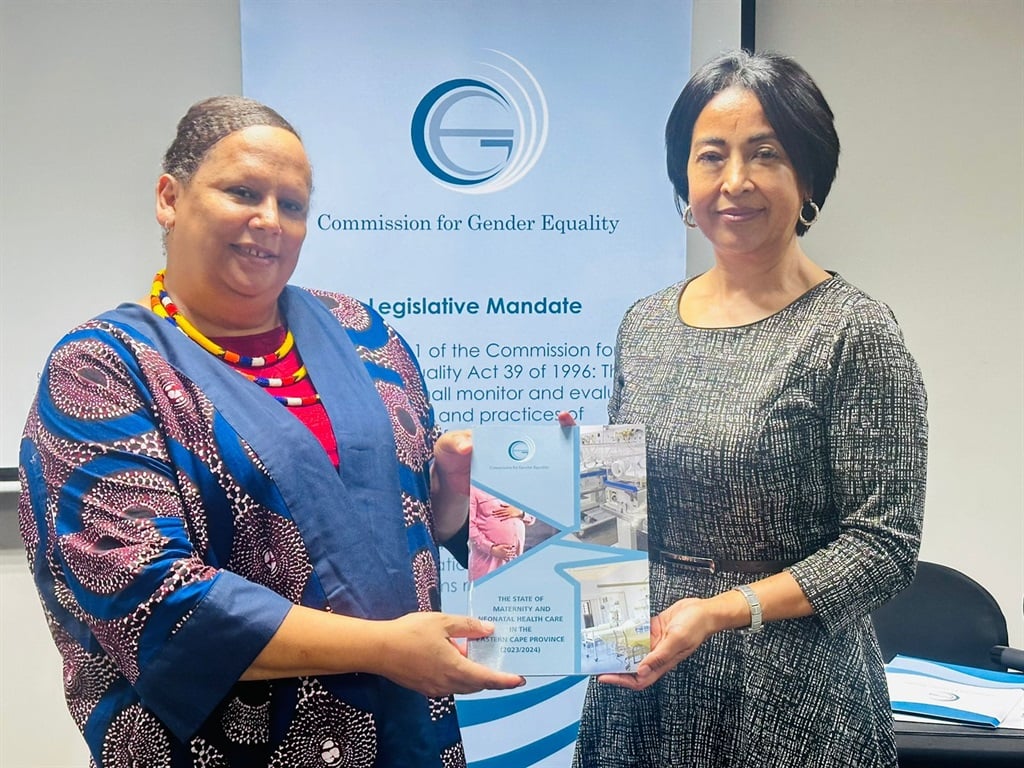
Commission for Gender Equality commissioner Leonashia Leigh-Ann Van Der Merwe handing over the investigation report to Eastern Cape Health Department’s head, Dr Rolene Wagner. (Sithandiwe Velaphi/News24)
- The Commission for Gender Equality investigated the state of maternal and neonatal healthcare in the Eastern Cape.
- The commission shared the findings of its investigation in East London on Tuesday.
- The Eastern Cape Department of Health said the findings of the investigation were “painful”.
Patients sharing beds, poorly maintained infrastructure, leaking roofs, pigeons roaming wards, and dirty beds were some of the findings of the Commission for Gender Equality’s (CGE) investigation into the state of maternity and neonatal healthcare in the Eastern Cape.
The investigation, carried out in the 2023/24 financial year involved six public healthcare facilities in the Eastern Cape, including Frere, Cecilia Makiwane, Bhisho, Livingstone, Dora Nginza and St Elizabeth hospitals.
The findings of the Chapter 9 institution’s investigation were shared in East London on Tuesday.
Noma-Afrika Wakashe, a legal officer at CGE, was part of the team that conducted the investigations and told those present that at Bhisho Provincial Hospital they found expectant mothers sleeping on dirty beds.
“We found that the women had brought their own linen at the hospital. They were in dirty beds. We found that the cleaner in their ward was also serving food to patients. The theatre was dirty,” Wakashe said.
At Frere Hospital in East London, Wakashe said they found that the lift, which is crucial for movement of pregnant mothers, was not working.
Wakashe said:
The tunnel to the maternity ward was dirty. There were also leaks around the ward. We found that complaints that were under litigation were inaccurately marked as resolved.
At St Elizabeth in Lusikisiki, the CGE found “high risk” patients sharing beds. The management of the hospital also missed the deadline to respond to questions by the commission for more than two weeks.
At Dora Nginza Hospital in Gqeberha, CGE found pigeons roaming wards because the maternity ward had broken windows.
Wakashe said they believe some of the maternal deaths were underreported in the province.
CGE CEO, Dr Dennis Matotoka, said: “In 2024, it cannot be that we are still saying we lack resources to discharge the constitutional mandate of providing basic human rights.”
“We realised that the rights to dignity, equality and reproductive healthcare are being stripped away because [officials] are failing to discharge their constitutional mandate,” he said.
The Eastern Cape Department of Heath’s head, Dr Rolene Wagner welcomed the investigation. She said the department was hamstrung by budget constraints.
“It’s painful because I am a woman,” said Wagner, who assumed duties last month after almost a year in a secondment at the Eastern Cape Office of the Premier.
READ | Frere Hospital crisis: Eastern Cape MEC’s surprise visit after complaints by pregnant women
She said in the first quarter of the 2024/25 financial year, there was a reduction in maternal deaths with a rate of 111 deaths per 100 000 deliveries.
Wagner said the leading causes of maternal deaths were identified as high blood pressure disorders in pregnancy, maternal HIV and TB, bleeding during and after birth, and bacterial infections of the female reproductive tract.
She said the department was working towards addressing these issues.
“The Eastern Cape Department of Health appreciates the work done by the Commission for Gender Equality and we welcome the opportunity to collaborate to advance gender empowerment.
“We also affirm our commitment to the process which aims to advocate for, and improve the rights of, our citizens. In particular, the historically disadvantaged woman and girl child.
“We are willing partners on this journey, and we look forward to a continued conversation about our challenges, but, more importantly, how we can leverage the opportunities presented through these collaborations,” Wagner said.
She added the department had allocated a budget of R1.6 billion in the 2023/24 financial year to improve infrastructure maintenance.